Jazz Road Map
The Presidencies: From The League to Laissez Faire
-

Woodrow Wilson and the Retreat from Versailles- America's entry into the Great War: "to make the world safe for democracy"
- The Hall of Mirrors: American idealism and European pragmatics—a new political world order, or revenge and reparations?
- Retreat (or relapse?) into isolation: The League of Nations without the U.S.
- The U.S. war economy and its backlash
-
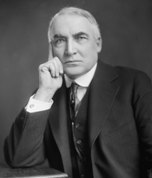
Warren G. Harding (1921 - 1923)- The prophet of the return to "normalcy"
- The myth of Negro blood and the womanizing President
Test Results Are In: At Long Last, The Secret About Harding is Out - The Great Teapot Dome scandal
-

Calvin Coolidge (1923 - 1929)- The apostle of non-action and presidential sourpuss--the man "weaned on a pickle."
- A four-hour workday: "Coolidge's chief feat was to sleep more than any other President. . . The itch to run things did not afflict him." — H. L. Mencken
- "The chief business of the American people is business. The man who builds a factory builds a temple.... The man who works there worships there."
- The Coolidge prosperity—a booming economy and stock market
By 1925 there were one and a half million active stock market accounts, and of these 40 per cent wildly speculative and on thin margin. The Dow Jones industrial average, which had hit bottom of 63.90 in 1921, soared to around 200 only six years later. The gross national product grew by nearly a third in the same period, coming within sight of one hundred billion dollars for the first time in the history of the nation.
The Fissure: The Ruralist State of Mind in Urban Culture
-

Prohibition (The Volstead Act) – Staying Wet or Going Dry?- Conserving grain: "temporary" non-proliferation of alcohol and the wartime effort, 1919
- Beer and the Germans: Liquor in US as "the Kaiser's mightiest ally" (Anti-Saloon League)
- Cultural effects:
- drinking hard liquor an act of defiance of arbitrary authority
- drinking a mark of sexual equality --- many young women drinkers
- the mob, bootlegging industry, and speakeasies (NY 1929: est. 32,000)
- racketeers and Big Business: intimidating labor organizers at Ford
-
The Red Scare. 1919-21- Fantasies of espionage and invasion
- The national panic: coal miner and steelworker strike
- Isolated bomb threats as evidence of a vast conspiracy
- The Palmer Raids---the witch hunt for Bolshevik sympathizers (60,000)
- The Emergency Quota Act of 1921
- The National Origins Act of 1924
- Sacco & Vanzetti, 1927---losing faith in American justice?
- The Ku Klux Klan Revival
- The Kloran--the bible of bigotry and white supremacy
- Post-World War I nationwide promotion and organization and recruitment campaign
- Great Imperial Wizard, Dr. Hiram W. Evans---est. membership, 5 Mio. in 1923
- Window signs of cooperation: "TWK"---"Trade with Klansmen"
-

Fundamentalist Revival- Thee champions of evangelism: Billy Sunday, Aimee Semple McPherson, William Jennings Bryan
- Anti-evolution legislation in the South
- Dayton, TN, 1925 -- The Monkey Scopes Trial, a national showcase and spectacle
- The beginnings of the erosion of fundamentalism---this time
The Great Homogenizers: Networks of Consumption
-

Film- The physical & moral dangers of movie houses---hotbeds of vice and lice: "excessive kissing"
- The first stars---sheiks and shebas: Rudi Valentino, Douglas Fairbanks; Clara Bow, Pola Negri
- Media ecology, ethics, and the shift to a visual culture
- Warner Bros. and Vitaphone: from the walkies (only) to the talkies -- silent to sound film
- Al Jolson in The Jazz Singer (1927), "You ain't heard nothin' yet."
- The decline of vaudeville and live performance
- Sound or silence?
Is the average performance of such a nature as to shape and develop moral fibre? Many persons are "visual-minded," that is, their sensations, emotions and impressions are derived for the greater part of what they "see" or "feel," rather than from what they read and think through from standard sources. This large class of non-readers secure snap-shot ideas of life from the screen--ideas of religion, morals, ethics, government, domestic life, forms of amusements, liberty and personal license. Little or no discrimination is made between the travesty and the real--the comic and the serious--the genuine and the superficial.... – Reverend John J. Phelan, 1919
[The advent of sound] marks the most spectacular act of self-destruction that has yet come out of Hollywood... The soul of the film--its eloquent and vital silence--is destroyed. The film now returns to the circus whence it came, among the freaks and fat ladies. – English Film Critic
I saw that the novel, which at my maturity was the strongest and supplest medium for conveying thought and emotion from one being to another, was becoming subordinated to a mechanical and communal art that, whether in the hands of Hollywood merchants or Russian idealists, was capable of reflecting only the tritest thought, the most obvious emotion. It was an art in which words were subordinate to images, where personality was worn down to the inevitable low gear of collaboration. As long past as 1930, I had a hunch that the talkies would make even the best selling novelist as archaic as silent pictures. People still read... but there was a rankling indignity, that to me had become almost an obsession, in seeing the power of the written word subordinated to another power, a more glittering, a grosser power.... – F. Scott Fitzgerald, "The Crack-Up"
- Radio
- The beginnings of the global village--broadcasting Hamlet to hamlets
- Athletic competitions and political conventions as national spectator sports
- The Duke in Paris, Texas--popularizing jazz over the airwaves (CBS)
- United States Early Radio History
-
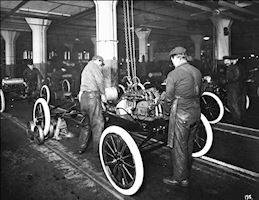
Automobile- From plaything of the rich to popular necessity--a triangulation of enabling conditions: a cheap and reliable car; a network of solid all-weather roads; a network of gasoline stations and repair shops
- Less is More: Henry Ford's Model T (1908) -- The national Chariot
- Changing buying habits and credit practices
- The mobile parlor, or, beds on wheels
- The rise of suburbia and the permeable boundaries of city and country
- The Power of the Ad
- The Invention of the American Vacation
The snobbery of automobilism. "Nothing has spread socialistic feelings in this country more than this picture of the arrogance of wealth" – Woodrow Wilson, 1907
- The Golden Age of Sports
- Baseball as the "national pastime" (Babe Ruth—"Why not? I had a better year.")
- Shift of urban rivalry from elites/clans to the general public
- Temporary erasure of ethnic and social distinctions in ball park and stadium: collective identification
- What's more important: politics or sports?
Struggling (with) Stereotypes: Of Bohemians and Cultural Trends
- Radicalism Revisited
- Much of the masqueraded as 'radicalism' in the Twenties was radical only in the sense of epater les bourgeois, using a confusedly Marxist vocabulatry for much the same reason that a later generation of student radicals would defend the use of four-letter words. (Carter 16)
Even in those with a strong impulse tward dissent, bohemianism triumphed over radicalism. – Richard Hofstadter
Jazz, Harlem, and The New Negro Renaissance
Harlem the smithy of the Black Soul forging the uncreated conscience and consciousness of the race.
[Harlem is] the laboratory of a great race-welding. Hitherto, it must be admitted that American Negroes have been a race more in name than in fact, or to be exact, more in sentiment than in experience. The chief bond between them has been that of a common condition rather than a common consciousness; a problem in common rather than a life in common. In Harlem, Negro life is seizing upon its first chances for group expression and self-determination. It is--or promises at least to be--a race capital. – Alain Locke, "The New Negro" 1925
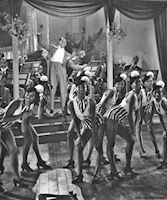
The Cotton Club Syndrome(1923)--Harlem as white uptown slumming Paradise, an Africa-on-the-Hudson, resonant with "the barbaric rhythms of Negro Jazz, the intoxicating dances, and the wild abandon of cabaret life after midnight" (Carl Van Vechten, Nigger Heaven 1927).
In the early 1920s an assortment of media moguls, Tin Pan Alley 'hep cats', and other profiteers raised their Eurocentric banners, and in the tradition of Christopher Columbus, proclaimed the 'discovery' of a new world of music which was just awaiting their guiding hand. -- The truth of the matter was that the Jazz Age conquistadors found a Black 'civilisation" that had already provided musicians with the necessary guidance and institutional support of booking agencies, theatre managers, nightclub operators, music reviewers, sheet-music companies, trade unions and training schools.... – Ted Vincent, Keep Cool 1995
-

Boostermism, Booboisie, and Babbitt- H.L. Mencken & Sinclair Lewis--the culture of fonfomity, consumption, and complacency
- Bruce Barton, The Man Nobody Knows: A Discovery of the Real Jesus (1925) -- Jesus as "the most popular dinner guest in Jerusalem", the #1 venture capitalist in America
- The Löwenthal thesis: atomization into the modern consumer society (Radio Research I, II 1944)
- journalistic biographies: from "idols of production" to "idols of consumption"
- dispelling the myth of private initiative and rugged individualism
- from rags to respectability (Horatio Alger) to happenstance
- the comon, that is, consumer, bond: brand-name soap, toothpaste, and deodorant
The world as a whole is still obviously in its earliest experimental stages with installment selling, with such mass distributive apparatus as chain stores and mail-order establishments, and with problems of more accurate market-appraisal estimates of potential buying power, etc. – Julius Klein, Dir. Bureau of Foreign and Domestic Commerce, 1928
- The Freud Fad
- The Buzz of the Village--the new rhetoric of liberation: inhibitions, inferiority complexes, libido, free love.
- Provincetown--Edna St. Vincent Millay, Susan Glaspell & Jig Cook: Suppresed Desires
- Free love and the free market--at a cost
Psychoanalysis is the greatest discovery made by intellectual conversationalists since Bergson and the IWW. Nothing quite so provocative of argument has happened since Nietzsche. As a science it has been going on quietly this score of years or more. But as a topic of polite conversation, it first saw the light of day a short while ago in the throbbing studios of Washington Square, where it immediately [sup]planted Cubism, Imagism, and Havelock Ellis. – Floyd Dell, The New Masses, 1915 (in 1915)
The new intellectuals' creed helped transform American from a Puritan-minded, savings-oriented society, worshipping long-held ideals of prudence, self-reliance, and frugality into a materialist- hedonist producers' and consumers' paradise. People extended themselves beyond all wisdom in their thirst for new toys. Thus the economy was in time subtly transformed by an intellectual revolution (American Heritage 82)
-
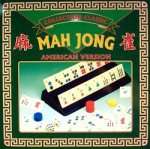
Other Cultural Moments and Icons- The flapper
- Dance marathons
- Flagpole sitters
- Mah-jong tournaments
- Crossword puzzles
- Channel swimming
- The Shimmy & Charleston craze
- Kahlil Gibran, The Prophet (1923)
The Stock Market Crash – Black Thursday, 24 October 1929
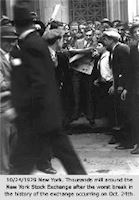
- The ignored danger signs, swollen inventories
- Comedian Eddie Cantor, "Do you want a room for sleeping or jumping?"
- American productivity and real wealth vs. continuing farm depression, unequal distribution of personal income, shaky credit, and wild speculative practices
- The general public—from Liberty bond issues (loans to Allies) to the securities market
- The stock market—from rich man's preserve to smalltime investor, from venerable banking houses to new (and frequently ruthless) firms
- Merger mania (violation of antitrust laws) and irresponsible business practices
- 1930-32—86,000 bankruptcies; wages fell an average of 60%; wipeout of 9 million savingsaccounts
- The Credit Bubble of the 1920s
Science could "not in any ultimate sense solve our problems." On the contrary, "the more we learn of the laws of [the] universe ... the less we shall feel at home in it ... We have grown used ... to a Godless universe, but we are not yet accustomed to one which is loveless as well, and only when we have so become shall we realize what atheism really means." – Joseph Wood Crutch, The Modern Temper